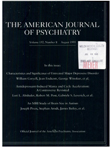A comparison of psychiatric symptoms in vascular dementia and Alzheimer's disease
Abstract
OBJECTIVE: Psychiatric symptoms account for much of the morbidity of vascular dementia and Alzheimer's disease. The goals of this study were to extend previous observations of the psychopathology and behavioral problems associated with vascular dementia and to compare the profile of symptoms in patients with vascular dementia to that in patients with Alzheimer's disease. METHOD: Twenty-eight pairs of patients (one with vascular dementia and one with Alzheimer's disease) were matched with respect to education, age, and severity of dementia. Their psychiatric symptoms were assessed with the Neurobehavioral Rating Scale, a 28-item observer-rated instrument, and the Hamilton Depression Rating Scale, and the symptoms in the two diagnostic groups were compared. RESULTS: Blunted affect, depressed mood, emotional withdrawal, motor retardation, low motivation, anxiety, unusual thoughts, and somatic concerns occurred in more than one-third of the patients with vascular dementia. There was no significant relation between severity of cognitive impairment and severity of these noncognitive symptoms. The patients with vascular dementia had more impairment than the patients with Alzheimer's disease, as indicated by the Neurobehavioral Rating Scale total scores and scores on the behavioral retardation, anxiety/depression, and verbal output disturbance factors. They also had a higher total score on the Hamilton depression scale and higher scores on 14 of the 17 Hamilton depression items. CONCLUSIONS: Patients with vascular dementia have more severe behavioral retardation, depression, and anxiety than those with Alzheimer's disease when the groups have similar levels of cognitive impairment. This probably reflects the contrasting brain regions typically involved in the two disorders.
Access content
To read the fulltext, please use one of the options below to sign in or purchase access.- Personal login
- Institutional Login
- Sign in via OpenAthens
- Register for access
-
Please login/register if you wish to pair your device and check access availability.
Not a subscriber?
PsychiatryOnline subscription options offer access to the DSM-5 library, books, journals, CME, and patient resources. This all-in-one virtual library provides psychiatrists and mental health professionals with key resources for diagnosis, treatment, research, and professional development.
Need more help? PsychiatryOnline Customer Service may be reached by emailing [email protected] or by calling 800-368-5777 (in the U.S.) or 703-907-7322 (outside the U.S.).



